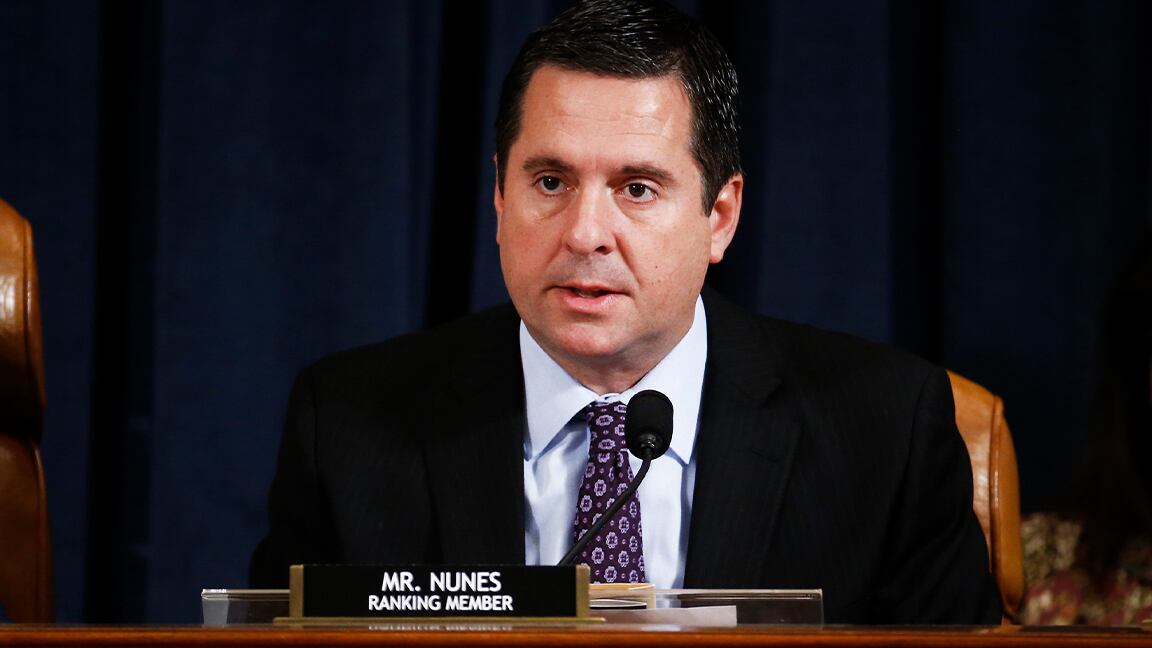House Democrats’ public impeachment hearings were designed to each day tell a new chapter in the same story. Over the course of a week, a dozen witnesses paraded through the grand room on Capitol Hill where the inquiry unfolded, each one testifying to different aspects of President Trump’s apparent campaign to pressure the Ukrainian government to investigate his political rivals.
Charged with weaving the Republicans’ counter-narrative—and crafting a case for the exoneration of Trump—has been Rep. Devin Nunes. The California Republican, as stalwart an ally of the president’s as there is, not only got more airtime than any other Republican lawmaker in the room, but had the first word and the last word for his side across seven hearings.
Slotted in between Chairman Adam Schiff’s daily paeans to conscience and Constitution and the witness’ earnest introductions—Nunes fundamentally sought to change the channel on impeachment. The millions of viewers getting a steady drip of Trump’s questionable activities on Ukraine were abruptly brought in, for five to 10 minutes each day, into an entirely different political universe.
In that universe, Trump is totally innocent of all of the Ukraine allegations, and what’s more, those allegations are just one more step in a coordinated and years-long conspiracy by an evil coterie of actors—Democratic Party operatives, the “fake news” media, faceless and nefarious “deep state” bureaucrats, and even Ukrainians themselves—who will stop at nothing to destroy the president.
It was the same story, and the same handful of chapters, that Nunes told across every day of the public impeachment inquiry. Ultimately, they blended together, becoming something like a prolonged shout into the void.
Indeed, Nunes’ remarks hardly ever left a lasting impact on the hearings themselves or the coverage of them. The viral moments went to the Republicans who focused laser-like on the Democrats’ case. Nunes himself left the room each day with little beyond some atta-boys from Trumpworld, a healthy dose of Fox News coverage, and plenty of snarky tweets from his dedicated online detractors. (Disclosure: Nunes has threatened to sue The Daily Beast over earlier reporting.)
Nunes almost seemed to invite the trolling with his baroque attacks on Democrats that were crafted to get a rise out of his Democratic colleagues, though they rarely took the bait.
“We’re supposed to take these people at face value when they trot out a new batch of allegations,” simmered Nunes during the Tuesday hearing. “The witnesses deemed suitable for television by the Democrats were put through a closed-door audition process in a cult-like atmosphere in the basement of the Capitol, where the Democrats conducted secret depositions, released a flood of misleading and one-sided leaks, and later selectively released transcripts in a highly staged manner.”
Over the course of seven opening statements—totaling some 6,300 words—Nunes would compare Democrats’ impeachment investigation to a “cult” two times. On three occasions, he raised the dubious claim that congressional Democrats tried to obtain “nude photos” of the president, searing that image into the congressional record for eternity. He used the word “hoax”—as in, Russia or Ukraine hoax—nine times.
The word “Chalupa” appears in Nunes’ opening statements eight different times, which gets at another element of Nunes’ complex counter-yarn: While the impeachment inquiry made public figures out of a few previously unknown individuals—notably U.S. Ambassador to the European Union Gordon Sondland, Fiona Hill, and Lt. Col. Alexander Vindman—Nunes attempted to introduce the public to a different cast of characters who would bolster his alternative version of events.
Looming large over that narrative in particular was the Chalupa in question: Alexandra Chalupa, a Democratic Party operative who is a central figure in a conspiracy theory that posits that she, while working for the Democratic National Committee in 2016, worked with Ukrainian officials to dig up dirt on Paul Manafort, then the Trump campaign chairman. Hardly a household name to those watching the proceedings from around the world, Chalupa was nonetheless a focus for Nunes as he demanded Schiff call her in to testify about the “real” Ukrainian election-meddling, the alleged campaign to smear Trump and help Hillary Clinton.
At other points, Nunes’ remarks seemed oddly untethered to the specific business at hand. Only once, for instance, did his opening statement reference an impeachment witness’ testimony directly. And in several of the hearings, he took to asking the same three questions each time, regardless: What the inquiry really needed to get to the bottom of, he said, was the anonymous whistleblower whose account launched the inquiry, alleged Ukrainian meddling in 2016, and Hunter Biden’s role with a Ukrainian gas company. The word “whistleblower” appears in Nunes’ prepared remarks 32 times; the name Biden 19 times.
Inside the hearing room, Nunes’ Democratic colleagues sometimes struggled to react with a straight face. On Wednesday, Rep. Tom Malinowski (D-NJ) sat in the front row of the members’ gallery and took in Nunes’ statement that day, during which he ran through what he said were “debunked conspiracy theories” pushed by the Democrats about Trump’s business ventures in Russia, that the Russians directed money for the Trump campaign through the National Rifle Association, and other stories with factual bearing.
At one point in Nunes’ speech, Malinowski slumped in his chair and covered his face with his hand—as if to shield a smirk, or a grimace, or both. Speaking to The Daily Beast later that day, he described what was running through his head: “I marvel, first of all, at his stupidity in repeating every single day for the American people the worst allegations that have been made against President Trump,” he said. “Every day, we’re reminded about Trump Tower Moscow, and about the possibility that the Russians have compromising information on the president of the United States.”
Malinowski, himself a former diplomat who worked in Europe, said he was “saddened” to see a member of Congress “broadcast Russian propaganda to the American people. It is Russian propaganda… It’s shocking to me that a senior member of this body would accept that foreign propaganda as truth.”
Nunes and his fellow Republicans, of course, bristled at the suggestion—levied by Hill herself from the witness stand—that they were complicit in spreading Russian propaganda in amplifying claims the Ukrainians meddled in the 2016 election, a narrative explicitly pushed by Moscow. To respond, he held up a copy of the 2018 report that he, while chairing the intelligence committee, released on Russian activities in 2016.
Despite his status as a key Trump ally and the most senior member on the intelligence panel, Nunes is not considered by his own party to be the sharpest questioner or most skilled storyteller on their side of the dais. GOP leadership specifically brought in Rep. Jim Jordan (R-OH) to temporarily serve on the committee due to its dearth of spotlight-ready attack dogs for the president.
And at week’s end, the consensus on Capitol Hill was that Reps. Elise Stefanik (R-NY) and Mike Turner (R-OH) emerged as the GOP’s most effective inquisitors. Notably, they spent less of their time weaving an elaborate “deep state” counter-narrative and more time drilling down on specific elements of the Democrats’ Ukraine impeachment case.
Nevertheless, Trumpworld was pleased with Nunes’ performance. “Everyone thought he did a great job. He wasn’t there to be the breakout star, like a Jim Jordan or an Elise Stefanik, and throw major bombs or anything like that,” said a senior White House official. “He coordinated and led the committee and everyone watching was happy with what he achieved.”
Of course, Nunes was delighted to toss bombs—and he had plenty for his Democratic colleagues and for the media. In a bizarre scene Tuesday, journalists listened and dutifully transcribed his opening statement that day, which amounted to an extended tongue-lashing against the dozens of reporters in the room. He cited specific stories and outlets in decrying coverage of the Russia investigation as “fake news” and accused reporters of libeling John Solomon, the reporter who fueled much of the Ukraine allegations in conservative media.
“The media, of course, are free to act as Democrat puppets, and they’re free to lurch from the Russia hoax to the Ukraine hoax at the direction of their puppet masters,” said Nunes. “But they cannot reasonably expect to do so without alienating half the country who voted for the President they’re trying to expel.”
On Thursday, the final day of public testimony, Nunes ended his final opener the way he often did: with a plea to Democrats for reason. “Let’s hope,” he said, “they finally learn a lesson, give their conspiracy theories a rest, and focus on governing for a change.”
—with reporting from Asawin Suebsaeng






